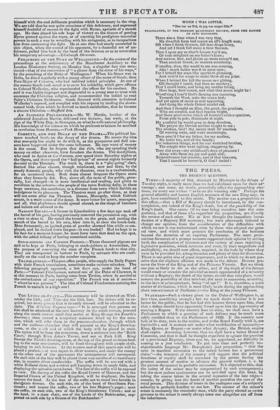THE PRESS.
THE REGENCY QUESTION.
TIMES—A majority of 154, obtained by Ministers in the debate of Tuesday night, is really more than we had calculated upon for their ad- vantage; and must, no doubt, powerfully affect the approaching elec- tions, for every one wishes " to be on the winning side." Perhaps the general affability and honest English manners of the new King may, in part, have contributed to this result. The motion was a proposition to this effect,—that a Bill of Regency should be introduced, in the con- templation, not indeed of the King's death, but of the possibility of the King's death. Our course (if we may bring ourselves into the com- parison), and that of those who supported the proposition, are directly the reverse of each other. We at first thought the immediate intro- duction of a Regency Bill necessary, but were afterwards induced to change our opinion, from the consideration of the difficulties with which we saw it was embarrassed even by those who adopted our gene- ral view, and which must protract the conclusion of the business beyond the duration of an expiring Parliament. The more perti- nacious favourers of a prompt measure supported their opinion by setting forth the complication of interests and the variety of cases requiring a legislative provision, which interests and cases, by their magnitude and multiplicity, we should now affirm, required, in the body by whom they were to be provided for, along duration and plenty of time for discussion. There is one point also of great importance, and to which we do not per
that the slightest allusion was made in the debate. Heaven pre- serve the lives of the King and of the Princess Victoria. But we think one just as likely to die as the other, and if the death of the former would create or occasion the mischief so much apprehended of a minority without a Regency, the death of the latter, should that take place, would remove the possibility of that mischief, the next in succession, according to the laws of primogeniture, being "of age'.'' It is, therefore, a mere matter of divination, which is most likely to die during the approaching short non-existence of Parliament—the King or the young Princess.
Sraxnann—Such a victory given to the Duke of Wellington is, at first view, mortifying enough ; but we much doubt whether it is not better for the public, that he has had this honour thrust upon him, than that a defeat should have apparently forced upon him the opportunity of naming a Regent. If the country does its duty, we shall soon have a Parliament to which a question of such delicacy may be much more safely confided than to the Parliament of 1820. If the country now fails of its duty, ruin to the nation, and to the Royal Family with it, are inevitable ; and it matters not under what modification of monarchy— King, Queen. or Regent—or under what dynasty, the British empire shall expire. Assuming, however, that we shall have a better House of Commons, and that it shall be thought expedient to agitate the question of a provisional Regency, there can be, we apprehend, no difficulty in coming to a just conclusion. To put into clear and perfectly un- objectionable language Mr. Brougham's just proposition, " that the next in manifest succession to the infant heiress has a paramount claim."—the interests of the country will suggest that the political functions of royalty shall be exercised by the person baying the greatest amount of motive to advance the general welfare, i. e. by the person the nearest in probable succession. It is objected to this, that the safety of the minor may be compromised by such arrangement ; but the most jealous cautiousness can be satisfied upon this head, by taking the course taken in the several regencies of the late reign— namely, by giving into the hands of another guardian the care of the royal person. This division of trusts in the analogous case of a subject's minority is perfectly familiar to our law. The curator of the minor's estate is commonly the remainder man, while the party elected as castes personw to the minor is nearly always some one altogether cut off from the inheritance.


























 Previous page
Previous page